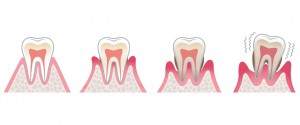 Would you like your teeth to last a lifetime? Most of us would, and it’s a very realistic goal. An important factor in making sure your teeth last as long as possible is to avoid periodontal disease – or as it’s known to many, gum disease.
Would you like your teeth to last a lifetime? Most of us would, and it’s a very realistic goal. An important factor in making sure your teeth last as long as possible is to avoid periodontal disease – or as it’s known to many, gum disease.
The Root Cause
The sad story of gum disease begins with a familiar culprit: plaque. Plaque is that sticky film of bacteria that forms on your teeth. It can be removed by brushing and flossing, but usually reappears within 24 hours. If it isn’t removed, plaque eventually hardens and turns into tartar, or calculus. Tartar must be removed by a dental professional. (Normal brushing and flossing won’t do it.)
If plaque and tartar remain on your teeth, they will continue to do damage. First, they will inflame the gums, or gingival; we refer to this as gingivitis. Eventually, deep pockets form between your teeth and gums. Plaque, tartar and bacteria fill these pockets. Infection in this area will advance under the gum tissue in time, leading to tissue, bone and tooth loss.
Symptoms of Gum Disease
It’s important to know that some victims of gum disease never show noticeable symptoms. This is why it’s important to get continual check-ups at your dentist.
Nonetheless, you should pay special attention to the following:
- Bleeding gums: Brushing shouldn’t cause your gums to bleed. This is often an early warning sign of periodontal disease.
- Bad breath: As plaque and bacteria collect between your teeth, they lead to this embarrassing problem.
- Red or swelling gums: Gum inflammation is an early sign of gum disease.
- Receding gums: As your gum slowly wears away, it will expose more and more of the upper section of your teeth.
- Sensitivity: Receding gums also expose tooth roots, which become sensitive to hot and cold.
- Periodontal abscess: Bacteria may become trapped in a periodontal pocket, where it fills with pus and causes a painful infection.
- Loose teeth: At advanced stages, bone loss causes teeth to loosen or move within the mouth.
Seek Treatment
If you’re worried you may be suffering from gum disease, you need to see the dentist as soon as possible. Give us a call at Rock Creek Dental, and we’ll schedule you an appointment as soon as possible.
